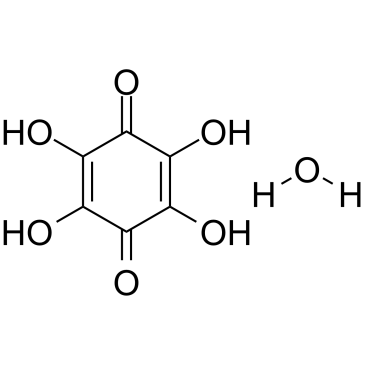Tetrahydroxyquinone monohydrate |
| Catalog No.GC61665 |
Tetrahydroxyquinone monohydrate (Tetrahydroxy-1,4-benzoquinone monohydrate), a primitive anticataract agent, is a redox active benzoquinone. Tetrahydroxyquinone monohydrate can take part in a redox cycle with semiquinone radicals, leading to the formation of reactive oxygen species (ROS).
Products are for research use only. Not for human use. We do not sell to patients.

Cas No.: 1215458-51-7
Sample solution is provided at 25 µL, 10mM.
Tetrahydroxyquinone monohydrate (Tetrahydroxy-1,4-benzoquinone monohydrate), a primitive anticataract agent, is a redox active benzoquinone. Tetrahydroxyquinone monohydrate can take part in a redox cycle with semiquinone radicals, leading to the formation of reactive oxygen species (ROS)[1].
Tetrahydroxyquinone (100-500 μM; 24 hours; HL60 cells) treatment shows cytotoxic for HL60 leukaemia cells by total protein content (IC50 of 20 µM), phosphatase activity (IC50 of 40 µM), or by MTT assay (IC50 of 45 µM). Tetrahydroxyquinone is an efficient inducer of ROS production in HL60 leukaemia cells[1]. Tetrahydroxyquinone efficiently activates caspase 3 in concentration in excess of 25 µM, stimulates DNA fragmentation at the same concentration and provoke phosphatidylserine exposure[1]. Tetrahydroxyquinone induces the release of cytochrome c from the mitochondria at concentration as low as 25 µM. Tetrahydroxyquinone treatment also causes increase of phosphorylation of Ser473 in protein kinase B (the Bad kinase for Ser112)[1].
[1]. Alexandre D Martins Cavagis, et al. Tetrahydroxyquinone induces apoptosis of leukemia cells through diminished survival signaling. Exp Hematol. 2006 Feb;34(2):188-96.
Average Rating: 5 (Based on Reviews and 11 reference(s) in Google Scholar.)
GLPBIO products are for RESEARCH USE ONLY. Please make sure your review or question is research based.
Required fields are marked with *




















